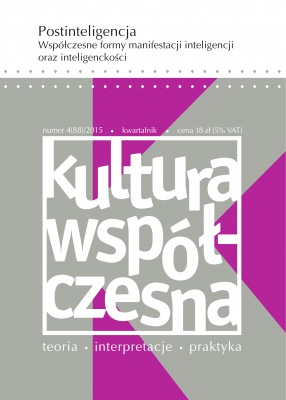Settings and search
Post-intelligence. Contemporary forms of manifestation for intelligence, and intelligentsia-related features


Table of contents
I POST-INTELLIGENCE. CONTEMPORARY FORMS OF MANIFESTATION FOR INTELLIGENCE, AND INTELLIGENTSIA-RELATED FEATURES
Paweł Śpiewak, Piotr Kulas
Post-intelligence. Contemporary forms of manifestation for intelligence, and intelligentsia-related features
Mikołaj Herbst, Aneta Sobotka
University studies as a leverage for promotion? Choices and educational paths taken by intelligentsia and by persons aspiring to climb up the social ladder
Marta Bucholc, Daniel Kontowski
Free or liberate? dilemmas of educating intelligentsia
Paweł Śpiewak
“Open society” dispute – one of the important sources for disputes among intelligentsia
Piotr Kulas
Young intellectuals and the intelligentsia. Analysis of images and representations of intelligentsia and intellectuals
Jan Śpiewak
Urban movements: power struggle in the field owned by intelligentsia, in the context of changes of the neo-liberal system
Eliza Kącka
Intelligentsia-related features – problem in the Polish literature, post-1989
II HUMANITIES PRACTITIONERS – WORKSHOPS
Anna Ziębińska-Witek
Museums related to history in the 21st century: transformation or lasting?
Albert Miścioniak
The cityscape as unconscious city memory. Illustrated with the example of Wrocław
III DISCUSSION: MIGRANTS, XENOLOGY, HOSPITALITY LAW
Tomasz Majewski (introduction), Krzysztof Wodiczko, Rafał Zawisza, Magdalena Szcześniak, Łukasz Zaremba, Anna Nacher, Jan Sowa, Sławomir Buryła, Justyna Kowalska-Leder, Iwona Kurz
IV EXPLANATIONS
Jadwiga Zimpel
Time of The Palace
Post-intelligence. Contemporary forms of manifestation for intelligence, and intelligentsia-related features
Post-intelligence. Contemporary forms of manifestation for intelligence, and intelligentsia-related features
- Paweł Śpiewak, Piotr Kulas
The authors are willing to compare education-related choices made two separate social groups who are trying to obtain the university degrees in Poland - the representatives of the traditional “intelligentsia”, and the persons coming from uneducated circles, within which getting a degree may result in getting to a higher level of the social ladder. The relevant context of the research is placed within the dynamic process which leads to making the higher education more common. The research also takes a closer look at the institutional solutions. The article uses both qualitative, as well as quantitative data, coming from the research realized by the University of Warsaw and by the Educational Research Institute. It has been proven that the educational paths of those aspiring to climb up the social ladder and of the representatives of the intelligentsia significantly differ, within the scope of motives, awareness, effect of the made choices, as well as within the scope of the quality of the received education and assessment and reflection on rightfulness of the decisions taken, seen from the perspective of a university graduate. It seems that, even though the higher education has been made available for the persons without “intelligentsia” heritage, social inequality still remains a permanent element of the higher education system, and the institutional solutions adopted in Poland have no positive impact on the role of a social advancement leverage, which is supposedly played by academia.
The authors are willing to translate the Polish discussion on transformation of the universities and reproduction of the intelligentsia into the language of global higher education trends. The tension between liberal education (multi-faceted, transformational) and liberalization of education (in an economic sense) is visible in project and product driven way of thinking (Michael D. Kennedy). Effective defense of liberal education by the Polish intelligentsia forms a requirement of changing the strategy, from internal one, based on ethos formed on implicit assumptions and status quo, into an empiric and evolving one, seeking assistance provided by other actors.
The aim of the present article is to describe one of the most important, and one of the most painful disputes, which divided, after 1989, and which still seems to divide, the Polish intelligentsia and the Polish intellectuals. The ideology-related or belief-related consequences of this division, formed at the beginning of the Polish transformation, are still prevalent within the public sphere. By using the tools of history of ideas, in order to describe the discourses on contemporary history of Poland, the author notes two main sides of this conflict, dominating the field of intelligentsia. Above all, the author is trying to reconstruct the applied arguments. Secondly, the article outlines the sets of beliefs of the two parties, being involved in the dispute. The author also notes the importance of the destructive character of the described dispute.
The aim of the present article is to make an attempt at describing the conceptual image of intelligentsia and intellectuals in the minds of the young members of Polish intelligentsia. Throughout the article, the authors analyse the young intelligentsia’s perception of the relationship between intelligentsia and the intellectuals. The authors also wonder, whether the intellectuals – as some researchers suggested – are perceived as an elite group which is still believing that intelligentsia exists, or whether they shall be treated as a separate, loosely linked, category. On the basis of the gathered materials, the authors create four main perceptions, regarding the relationship between intelligentsia and the intellectuals. The article also lists the main points of tension created by the two aforementioned identifications. The work is empirical, it is placed within the sociological problem area, regarding the research covering the self-knowledge of the Polish intelligentsia.
The aim of the herein work is to present the role played by the urban movements in the field taken by intelligentsia, within the context of changes in the neo-liberal system. In this approach, urban movements may be interpreted as resistance, fighting against neo-liberalization of the processes that govern the city. Contrary to the movements of similar origin in the west (right to the city movements), members of the Polish movements are placed at the top of the social ladder. The urban activists include members of post-intelligentsia, referring to the intelligentsia’s ethos and heritage. The urban movements are rather an intellectual-sociable movement, rather than a social movement in a classic meaning of the term. These groups use the language of national modernization which is to be carried out in line with the rules of sustainable development, and according to renewal of the urban democracy, in line with the “right to the city” spirit. This legitimizes their contribution to the game, the aim of which is to gain hegemony in the field of intelligentsia, playing the dominating role in the Polish field of power.
The article places the selected phenomena of the Polish literature published after 1989, within the intelligentsia-related context. It describes the writer’s stances and strategies, indicating that the specific components of an image of a member of intelligentsia shall be redefined or have become outdated, including: expressly visible social involvement, non-conformist stance, individualism etc. The article, at the same time, states a question – how literature may influence the assessment of condition of the intelligentsia, after the 1989. It stresses the differences in manifestation of intelligentsia-related features in the texts and statements made by the writers born in the 1960s, 1970s and 1980s. It also considers the problematic character of the intelligentsia-related issues category itself.
Humanities practitioners – workshops
Contemporary reflection on museums often questions the purpose and assumptions of a modernist museum. Numerous researchers stress the innovative character of the newly established museums, and they note that the exhibition techniques and strategies are completely changed, evolving towards theatrical, performative and interactive character, achievable thanks to the fact that modern technologies, multimedia and simulations are more and more often used, within the exhibits. However, does the process of transformation of the museums, into modern, dynamic, qualitatively different cultural bodies, really take place? If yes (and the author doubts it happens) does it take place smoothly, without any shock? We are facing a situation in which museums (particularly those referring to the history) became a field for numerous conflicts.
The cityscape as unconscious city memory. Illustrated with the example of Wrocław - Albert Miściorak
After 1945, the historical continuity in Wrocław was broken. Even today the city is considered to be a memoryless place. Is this thinking correct, though? In my paper, I will approach the issue of urban memory from the point of view of the cityscape. Using the example of the three housing estate in Wrocław, I will analyze the ways in which “post-German” elements of the urban landscape – including those physically degraded ones, devoid of their symbolic function – unwittingly influenced the memory and identity of the new inhabitants of the neighbourhood. How did the cityscape “retain memory”? What message did it convey? What time period did it refer to? How did it influence the way its inhabitants experienced time and change?
Discussion
Discussion: migrants, xenology, hospitality law - Tomasz Majewski (introduction), Krzysztof Wodiczko, Rafał Zawisza, Magdalena Szcześniak, Łukasz Zaremba, Anna Nacher, Jan Sowa, Sławomir Buryła, Justyna Kowalska-Leder, Iwona Kurz
Explanations
Michał Murawski, Kompleks Pałacu. Życie społeczne stalinowskiego wieżowca w kapitalistycznej Warszawie [The Palace Complex: The Social Life of a Stalinist Skyscraper in Post-Socialist Warsaw], przeł. E. Klekot, Muzeum Warszawy, Warszawa 2015.
